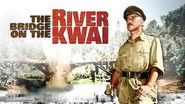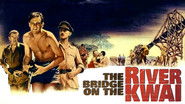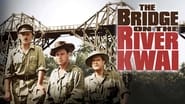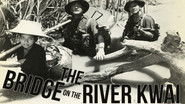Solemplex
To me, this movie is perfection.
Stometer
Save your money for something good and enjoyable
Reptileenbu
Did you people see the same film I saw?
Raymond Sierra
The film may be flawed, but its message is not.
BellaDancerSF
Brilliant filmmaking. Suspenseful, articulate direction. Genius performances, starting with Alec Guinness, and all the way through. Even a great song and theme. Brilliant.
eric262003
In the Golden Age of cinema, David Lean was dubbed as the king of epics. One of his more high-prolific entries into that category was the 1957 classic "The Bridge on the River Kwai". To me the top priority of this movie wasn't emphasized on World War II. The film centres around a strict, but well-defined British officer Col. Nicholson (Alec Guinness), a lesser disciplined American soldier Commander Shears (William Holden) and a tyrant prison officer Col. Saito (Sessue Hayakawa) who were placed in a Japanese prison camp where they were forced into labour to build the railway bridge over the River Kwai that connects from Bangkok and Rangoon. While this is done these three individuals try everything to co-exist with one another. You see very little of the war. The abysmal conditions of the prison camp is hard to swallow and cruelty that comes with the package is not for the faint of heart. This is where the best scenes take place, especially those who are into character-driven movies. This is where the performers truly exhibit themselves so that they can get Oscar recognition. And the harsher the conditions the better. Like a blessing in disguise for the viewers. It's quite astounding that the characters come to life as we are invested in the main three characters (and a few supporting ones) become more fascinating as they develop. I was very pleased that Hayakawa was made into a great character, a lesser made film would've dismissed him into a one dimensional cartoon like villain. Lt. Col. Nicholson is a dedicated officer who's by the book persona gives him that edge of a true leader in his world. He will not budge unless Saito shows more respect towards the Geneva convention in which officers are forbidden to manual labour, in spite of his orders that prisoners in spite of their rank must build this bridge. But when Saito takes the request into consideration or else face ritual suicide, Nicholson goes through great lengths to humiliate the Japanese by upstaging and promoting how great the British Army is buy building a better bridgeIn spite of how proud and dedicated he is towards the British Army, Nicholson is far from perfect, in fact his flaws are quite obvious. His role becomes that of the tragic hero in which even the good guys can get their comeuppance. His character blunder comes from the issue he was fighting against ends up taking over his life as his building of the monument becomes all that matters to him and what the purpose at to why this bridge is being constructed."Bridge on the River Kwai" works on various levels in terms of great pace, remarkable characters and well put together plot, there is still a major flaw that holds this movie to being a masterpiece. While doing everything in its power to make this war film not emphasizing too much on the war, the last fifteen minutes ends up becoming all about the war and the preachy cliches there are about how bad war is. If they would've kept up with the human drama, this movie could've been pure gold, not that is was overrated. The political sentiments just takes over in the end and when the final quote, "Madness, Madness" comes around after all the chaos has happened, it leaves a sout taste in your mouth.Many reviewers have said that this movie has anti-war written all over the script and that the after effects of the war can cause even the sanest individual traumatized. No disrespect to the reviewers, but that is not the case. Up until the last 15 minutes it was all about men going out of their ways fighting through hard times during very complicated times. The war was used as a decoy to represent the setting of this film. and even if this film has the anti-war theme stamped all over, they should have kept it more hidden than blurted out in the end which was a cop-out to a potentially reasonable ending.Sure I may be fixated on this flaw too much, but it's because I cared so much bout the movie and director David Lean got lazy and just rushed off the ending too fast making the ending way too inorganic. In spite of this flaw, "The Bridge on the River Kwai" is a remarkable movie to enjoy and it still holds well as one of the best classic epic films with a great cinematic achievement in character driven movies.
frankwiener
Before I write IMDb reviews, I try to do as much research about the subject film as time allows. As part of my research, I always read a sampling of other user reviews in order to taste the prevailing sentiment of the film, pro, con, and indifferent. Many of the most negative reviews about this film object to the alleged falsification of history by the creators. Although I was disappointed with this latest viewing of the movie, I don't agree with these reviewers. The film is a work of fiction that is loosely based on a true, historical event, and that is how it is to be viewed. I recently watched "The Best Years of Our Lives", another film, much more to my liking, that is also centered on World War II but focused on an entirely different aspect of that war, the daunting adjustment of combat veterans to a civilian life back home in a world that was supposed to be peaceful but wasn't. As in the case of this film, that film was a work of fiction based on true experience, but neither film was intended to be a factual account of non-fiction. The actual combat disability of actor Harold Russell in "Best Years of Our Lives" is very real, but he doesn't portray himself or his own, personal story in the movie. In this case, no one is denying that Allied prisoners were treated much more harshly by their Japanese captors than depicted here or implying that the real colonel, upon whom the story is based, collaborated with the enemy as the fictional Colonel Nicholson did. My own problem with this film is that it opens with a very dramatic battle of wills between Colonel Saito and Lt. Colonel Nicholson and ends with an even more spectacular finale, but I found myself fairly bored in between. While the scenery of Ceylon (now Sri Lanka) was quite spectacular, much of the dialogue was dull and even banal. Although the Siamese (Thai) women were very pleasant to behold, but there seemed to be a huge gap between the captivating beginning and the sensational ending. Alec Guiness, who was very reluctant to take the role of Nicholson, created an intriguing portrayal of the officer in charge of the Allied prisoners. Sessue Hayakawa was equally as good as his counterpart, the Japanese officer in charge of the prison camp. Many notable actors, including Charles Laughton, refused the role of Nicholson because they didn't understand his motivation, a view which should be appreciated. Others believed the material, based on a French author, to be viciously anti-British, which is also a reasonable interpretation. I was unimpressed by the rest of the cast, and I consider myself generally to be a fan of William Holden. His exchange with the bribed Japanese guard was nothing short of ridiculous. I was actually embarrassed for poor Bill, who didn't seem to be emotionally involved in the lame dialogue. As a result of the commendable performances of both Guinness and Hayakawa, the beautiful cinematography by Jack Hildyard, the film's trademark whistling of "Colonel Bogey's March", and an unforgettable ending that was worth the long wait, I rated it a 7 out of 10. I strongly disagree that fighting the Japanese and the Germans in the most effective way possible during World War II amounted to "madness" as this film seemed to suggest at the end. That is just wrong.
mcaton15
I watched this movie with my grandma at night she was over, everyone else was gone to bed and we were looking through Netflix for a movie to watch. After some looking we stumbled across Bridge on The River Kwai. Being an elder person herself she remembered it from her childhood, so we watched it. The film is slow, yes. But that doesn't harm it, even though it's 160 minutes long, it "only" feels as it is 2 hours long. This length gives you the ability to care about our principal cast. And the ending, though without grand dramatic music is extremely intense. And grandma and I where both at the edge of our seats. I've read that this movie is not completely historically accurate, this does not bother me as this isn't a documentary but a work of fiction to enjoyed. Definitely recommend to anyone with a love for film making, and it does sadden me that this film isn't rated higher, an all time classic.









